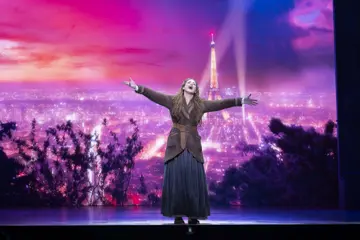“I spent ten-plus years making movies on 16mm, being asked over and over again when I was going to make a movie on video. And there was some contrarian streak in me that was like: 'you want video, here's video!'” laughs Andrew Bujalski. The 36-year-old filmmaker has just made Computer Chess, a film about computer programmers in 1980 shot using era-specific Sony Portapak 'technology'. “I thought about the camera before anything else: what would it mean to tell a story in those images?”
These images are blurry, wobbly, and in ghostly black-and-white, with a constant sense of experimentation at odds with the nondescript naturalism of 2002's Funny Ha Ha, 2005's Mutual Appreciation and 2009's Beeswax. “Previously, I wanted each movie to look un-self-conscious, to never draw attention to itself. With [Computer Chess], I wanted everything about it to absolutely draw attention to itself.” Taking the idea of a computer chess tournament from a book of chess trivia he'd bought for $1 from a remainder bin, Bujalski treated the screenplay as his “happy fantasy place”; the “least commercial, most fun” idea he'd turn to when “frustrated at thinking of ways to make a living.” Having grown up a science-fiction nerd, he wanted to tap into the tenor of technology in the '80s. “There was a sense of wonder, but a lot of philosophical questions seemed to hang in the air,” Bujalski recalls. “We all knew that computers were going to change our lives, but we didn't quite know whether we were relinquishing our humanity, too.”
When time came to cast a film conversed in arcane jargon, Bujalski stayed with his realist cinematic ways. “You can hire actors and put glasses on them and mess up their hair, but there's no better way to get your computer programmers to sound like computer programmers than to hire a bunch of computer programmers.” So, amidst more 'known' nerds like film critic Gerald Peary, animator Bob Sabiston, and Linklater legend Wiley Wiggins, there are computer-programming professors Gordon Kindlmann, Patrick Riester and James Curry, continuing the filmmaker's long-standing practice of working with non-professional actors. “I'm always wary of casting anyone too familiar,” Bujalski admits. Yet, retroactively, Beeswax now has a bona fide TV star in its midst: Alex Karpovsky. “I'm so happy for Alex, I always fantasised that one of the actors in my movies would become a big star,” beams Bujalski. “I welcome any Girls fans who love Alex to come and watch [Beeswax].” As the 'Godfather of Mumblecore', Bujalski crossed paths with Girls creator/debate-starter Lena Dunham very early in her ascent (“of all the people I've known who I've seen make their way towards stardom, Lena, more than anyone, has done it completely on her own terms”); the pair first meeting at SXSW's indie-movie breeding-ground. The social angle of film festivals was something Bujalski tapped into for Computer Chess; its convention hijinks drawn from the director's past. “To some extent that's every film festival!” says Bujalski. “As much as it's a great thrill to be invited to film festivals, especially internationally, at a certain point, when you keep seeing the same people in these hotels city after city, you do think: 'I know we're all artists here, but it's starting to feel like we're all carpet salesman going from one convention to the next.'”

WHAT: MIFF – Computer Chess
WHEN & WHERE: Saturday 4 August, Greater Union; Friday 9 August, Forum Theatre















